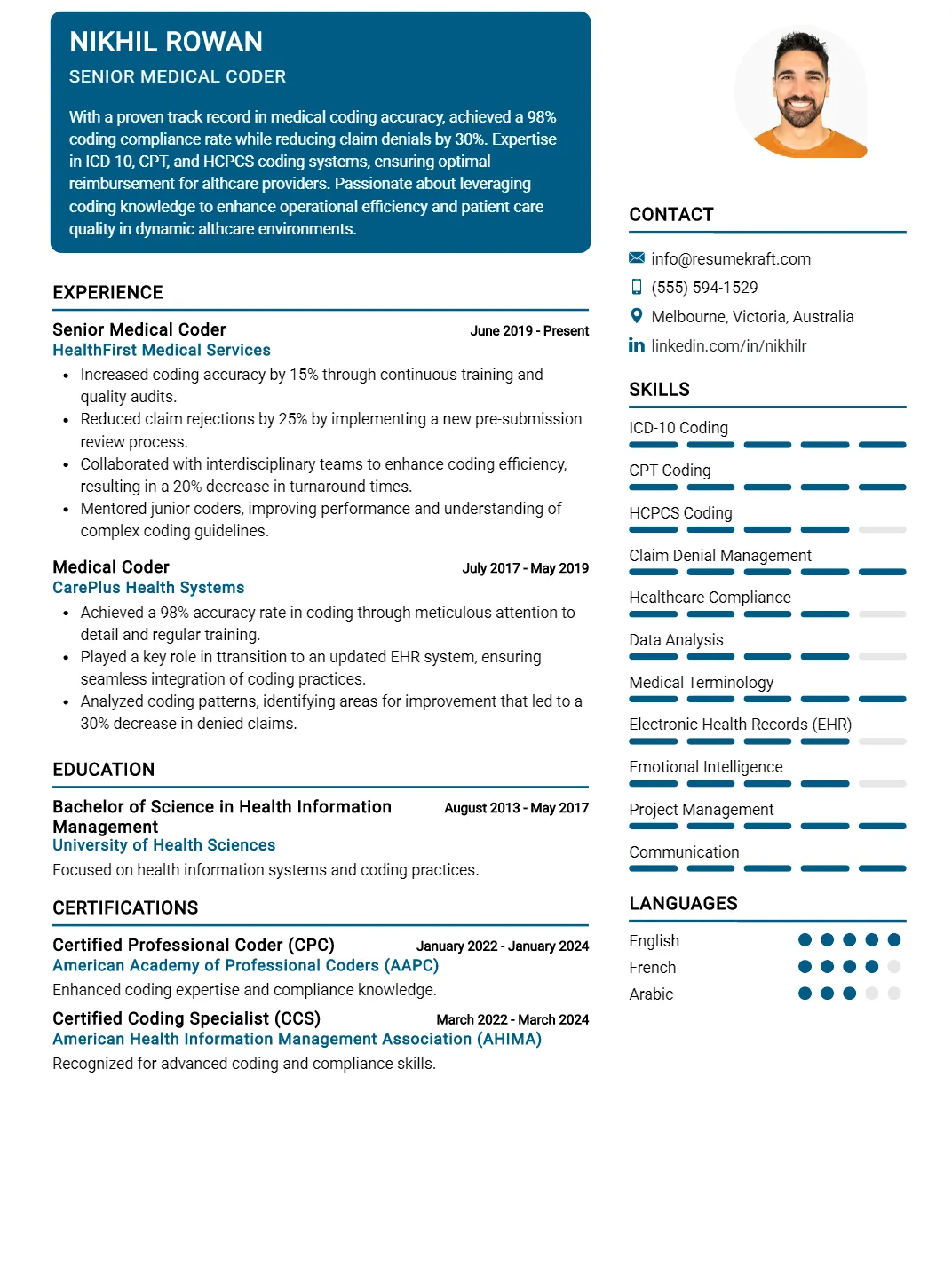
Medical coders play a crucial role in the healthcare industry by translating medical diagnoses, procedures, and services into standardized codes used for billing and insurance purposes. This profession is essential in today’s job market as it ensures accurate record-keeping, facilitates efficient billing processes, and contributes to the overall financial health of healthcare organizations. With the increasing complexity of healthcare regulations and coding systems, skilled medical coders are in high demand. This article will explore how to effectively craft a resume that highlights the necessary skills and experience to excel in this vital field.
- Medical Coder resume examples
- How to format a Medical Coder resume
- How to write your Medical Coder resume experience
- How to list your hard skills and soft skills on your resume
- How to list your certifications and education on your resume
- How to write your Medical Coder resume summary or objective
- Additional sections for a Medical Coder resume
- Key takeaways for writing a professional Medical Coder resume
- Frequently Asked Questions
Medical Coder resume examples
Medical Coder resume examples serve as valuable resources for job seekers looking to create compelling resumes tailored to the healthcare industry. These examples highlight the essential skills, qualifications, and accomplishments that make an effective resume for a Medical Coder. By studying these samples, candidates can better understand how to showcase their expertise and stand out to potential employers in a competitive job market.
Medical Coder Resume
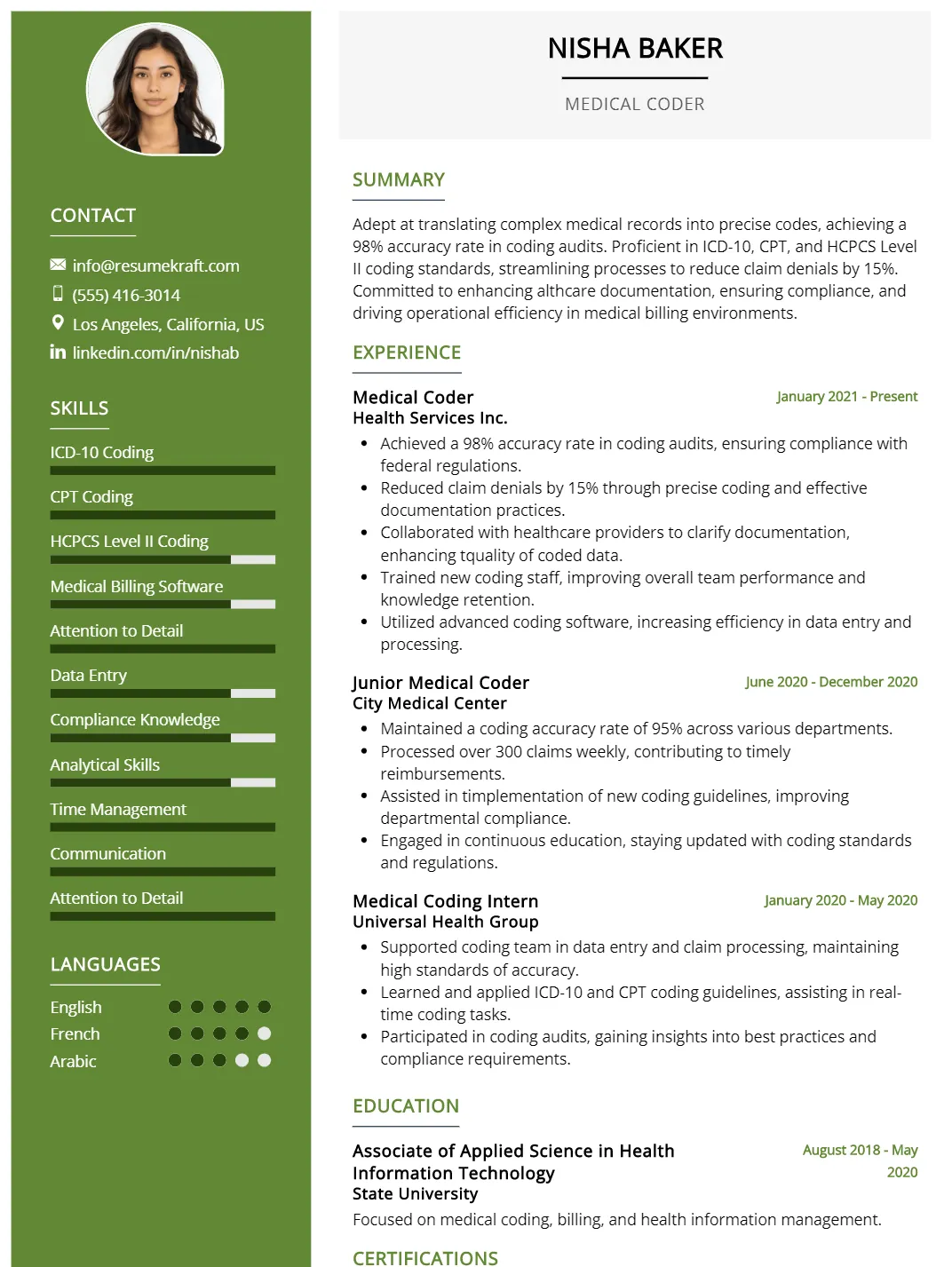
Why This Resume Works
This resume effectively highlights the candidate’s relevant skills, including proficiency in ICD-10, CPT, and HCPCS Level II coding, which are crucial for a Medical Coder position. With four years of experience, the structured format clearly presents their career progression from intern to coder. The use of industry-specific keywords enhances ATS compatibility, ensuring it passes automated screenings. Additionally, strategic emphasis on achievements in coding accuracy and efficiency underscores the candidate’s attention to detail, making them a strong fit for this role.
Entry-Level Medical Coder Resume
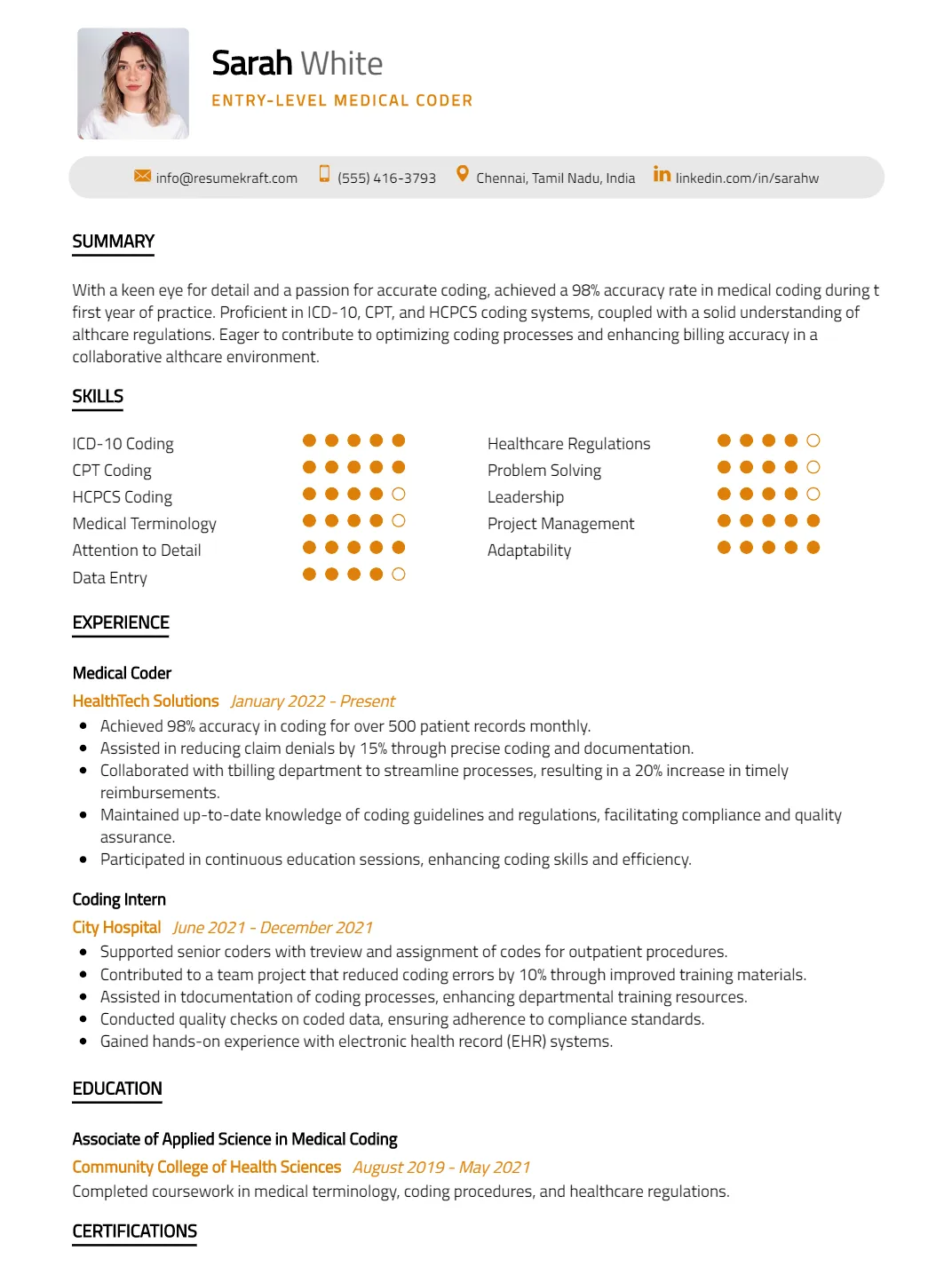
Why This Resume Works
This resume effectively positions the candidate for an Entry-Level Medical Coder role by highlighting essential skills like ICD-10, CPT, and HCPCS coding alongside medical terminology expertise. The three years of relevant experience as a Medical Coder and Coding Intern demonstrate practical knowledge and readiness for the job. Its clear format enhances readability, making it ATS-compatible with industry-specific keywords. Additionally, the strategic presentation of achievements showcases attention to detail—crucial in maintaining coding accuracy—making this resume particularly compelling for prospective employers in healthcare.
Senior Medical Coder Resume

Why This Resume Works
This resume effectively highlights the candidate’s extensive experience as a Senior Medical Coder, showcasing key skills like ICD-10, CPT, and HCPCS coding. The structured format allows for easy navigation, emphasizing relevant accomplishments in claim denial management and healthcare compliance that resonate with hiring managers. Additionally, it incorporates industry-specific keywords to ensure ATS compatibility, increasing visibility during the screening process. By strategically presenting achievements that demonstrate expertise in coding accuracy and compliance, this resume positions the candidate as an ideal fit for the role.
Medical Coder with Oncology Specialization Resume
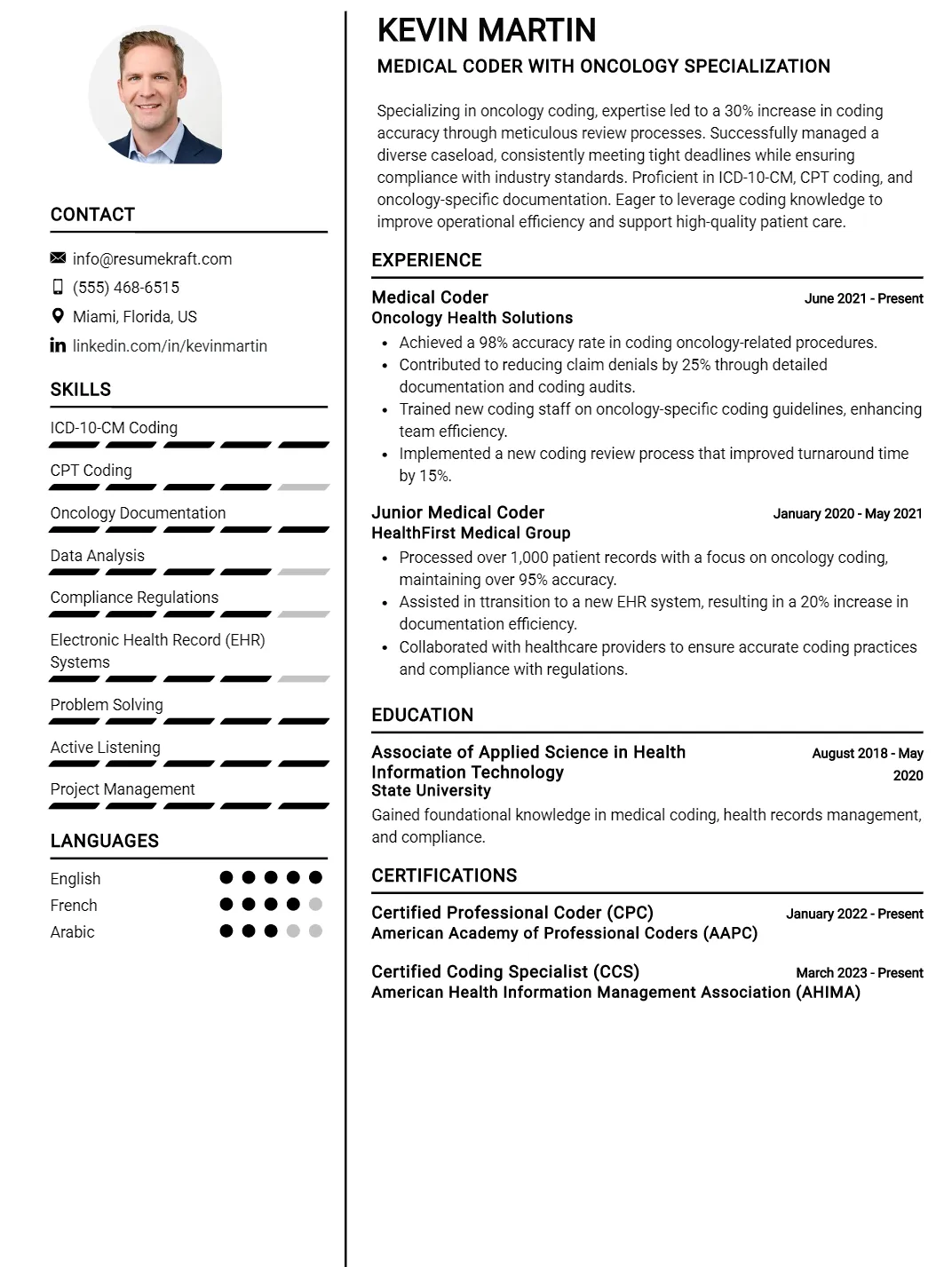
Why This Resume Works
This resume effectively highlights the candidate’s specialized skills in ICD-10-CM and CPT coding, essential for an Oncology-focused role. With five years of relevant experience, it showcases a solid foundation in oncology documentation and compliance regulations, making the candidate stand out. The structured format enhances readability and ensures easy navigation for hiring managers. Additionally, the use of industry-specific keywords boosts ATS compatibility, while strategically presented achievements underscore the candidate’s impact in previous roles, aligning perfectly with the demands of medical coding in oncology.
Transition into Medical Coder from Pharmaceutical Sector Resume
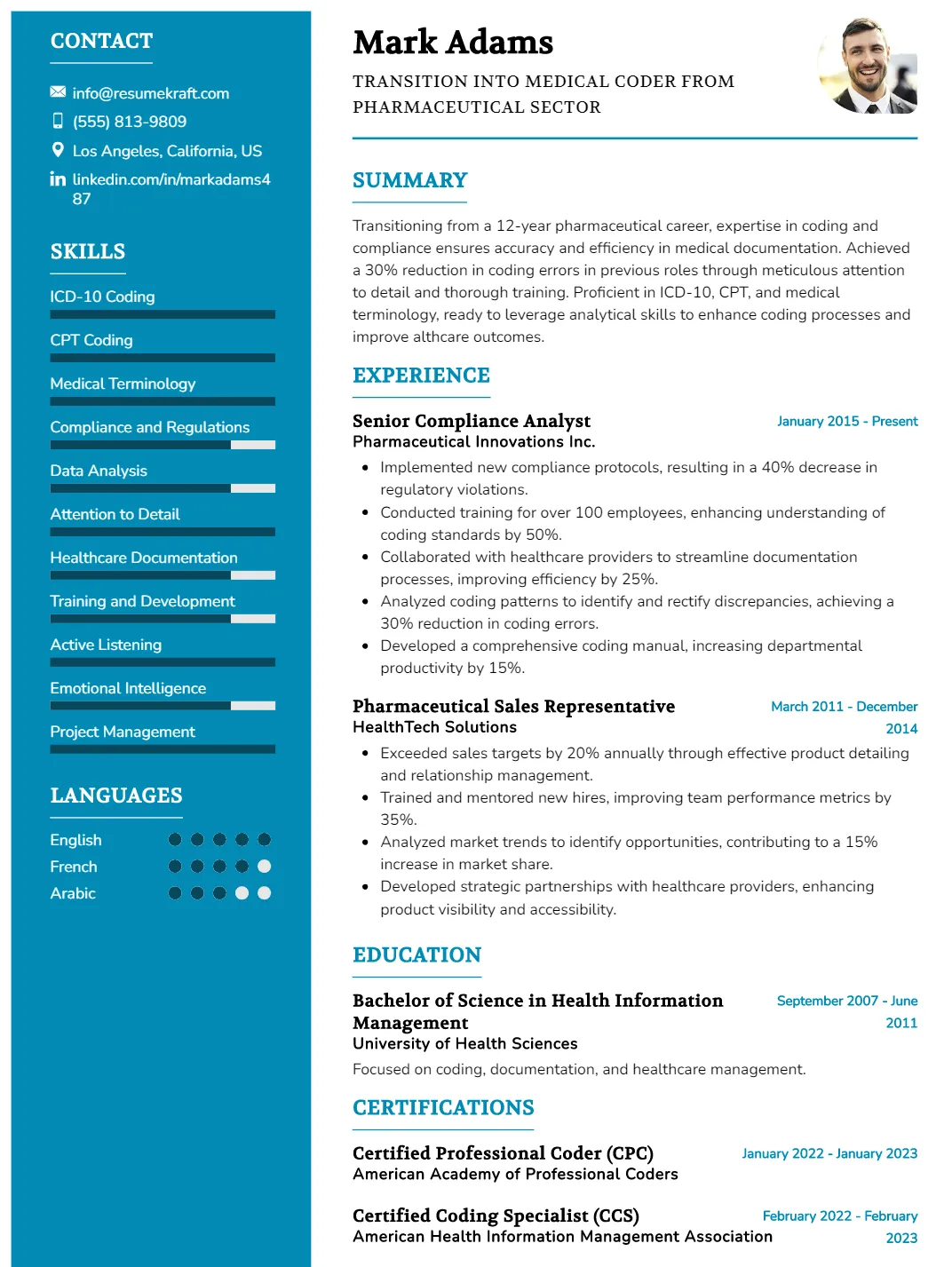
Why This Resume Works
This resume effectively positions the candidate for a transition into Medical Coding by highlighting relevant skills such as ICD-10 and CPT coding, alongside strong medical terminology knowledge. Their 13 years of experience in compliance analysis within the pharmaceutical sector demonstrates an understanding of industry regulations, essential for coding accuracy. The structured format enhances readability, ensuring ATS compatibility through keyword optimization. Additionally, strategic presentation of achievements showcases data analysis capabilities and a proven track record in compliance, making them an attractive candidate for this role.
Certified Medical Coder Specialist in Cardiology Resume
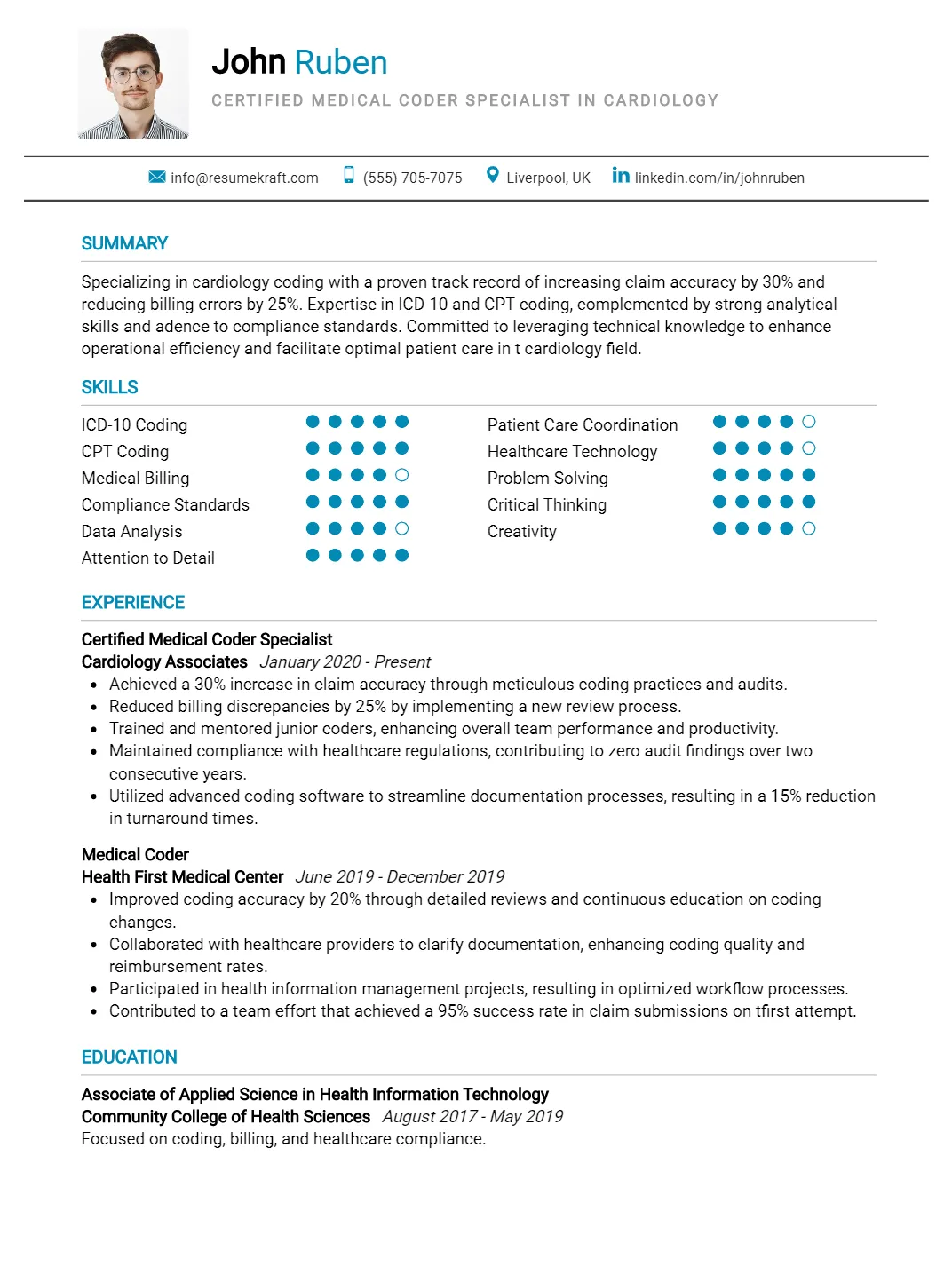
Why This Resume Works
This resume effectively showcases the candidate’s qualifications for a Certified Medical Coder Specialist in Cardiology by highlighting essential skills such as ICD-10 and CPT coding, which are critical in this specialty. The structured format allows for easy navigation, ensuring that key information is readily accessible, while addressing ATS compatibility through relevant keywords. Additionally, strategic presentation of achievements emphasizes the candidate’s impact on compliance and data accuracy, making them an appealing choice for employers seeking expertise in cardiology coding and billing.
Clinical Documentation Improvement Specialist – Medical Coding Resume
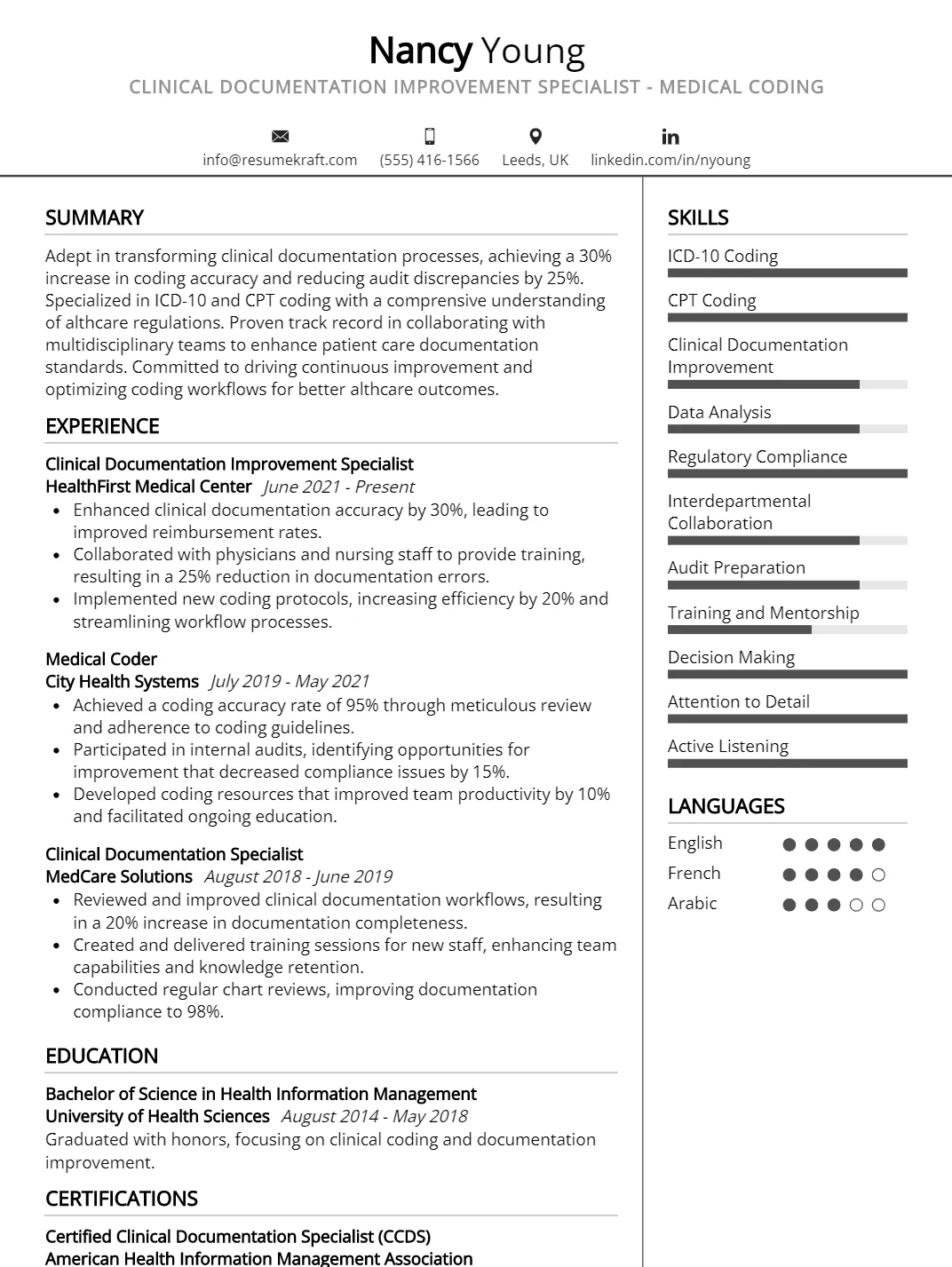
Why This Resume Works
This resume effectively highlights the candidate’s relevant skills and extensive experience in clinical documentation improvement and medical coding, showcasing proficiency in ICD-10 and CPT coding. The structured format emphasizes key competencies, making it easy for hiring managers to identify qualifications quickly. Additionally, the use of industry-specific terminology enhances ATS compatibility, ensuring visibility in automated screenings. By strategically presenting achievements that demonstrate regulatory compliance and data analysis expertise, this resume aligns perfectly with the requirements for a Clinical Documentation Improvement Specialist – Medical Coding position.
Inpatient Medical Coding Supervisor Resume
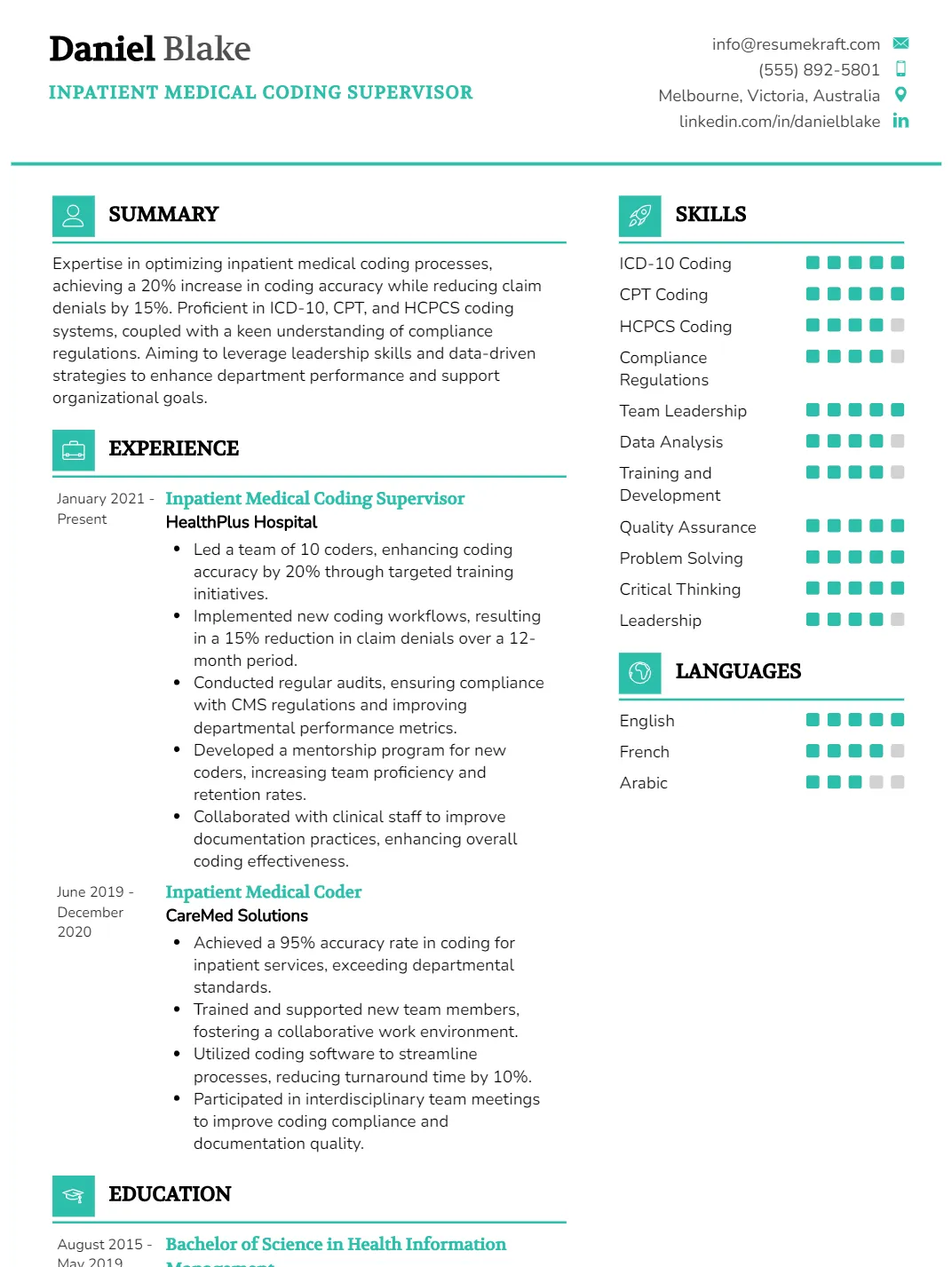
Why This Resume Works
This resume effectively showcases the candidate’s qualifications for the Inpatient Medical Coding Supervisor position by highlighting essential skills like ICD-10, CPT, and HCPCS coding alongside compliance regulations and team leadership. The structured format enhances readability, ensuring key information is easily accessible for hiring managers. Additionally, the inclusion of industry-specific keywords improves ATS compatibility, increasing the chances of passing initial screenings. Strategic presentation of relevant achievements underscores the candidate’s impact in previous roles, demonstrating their capability to lead and excel in medical coding supervision.
Remote Medical Coder Team Lead Resume
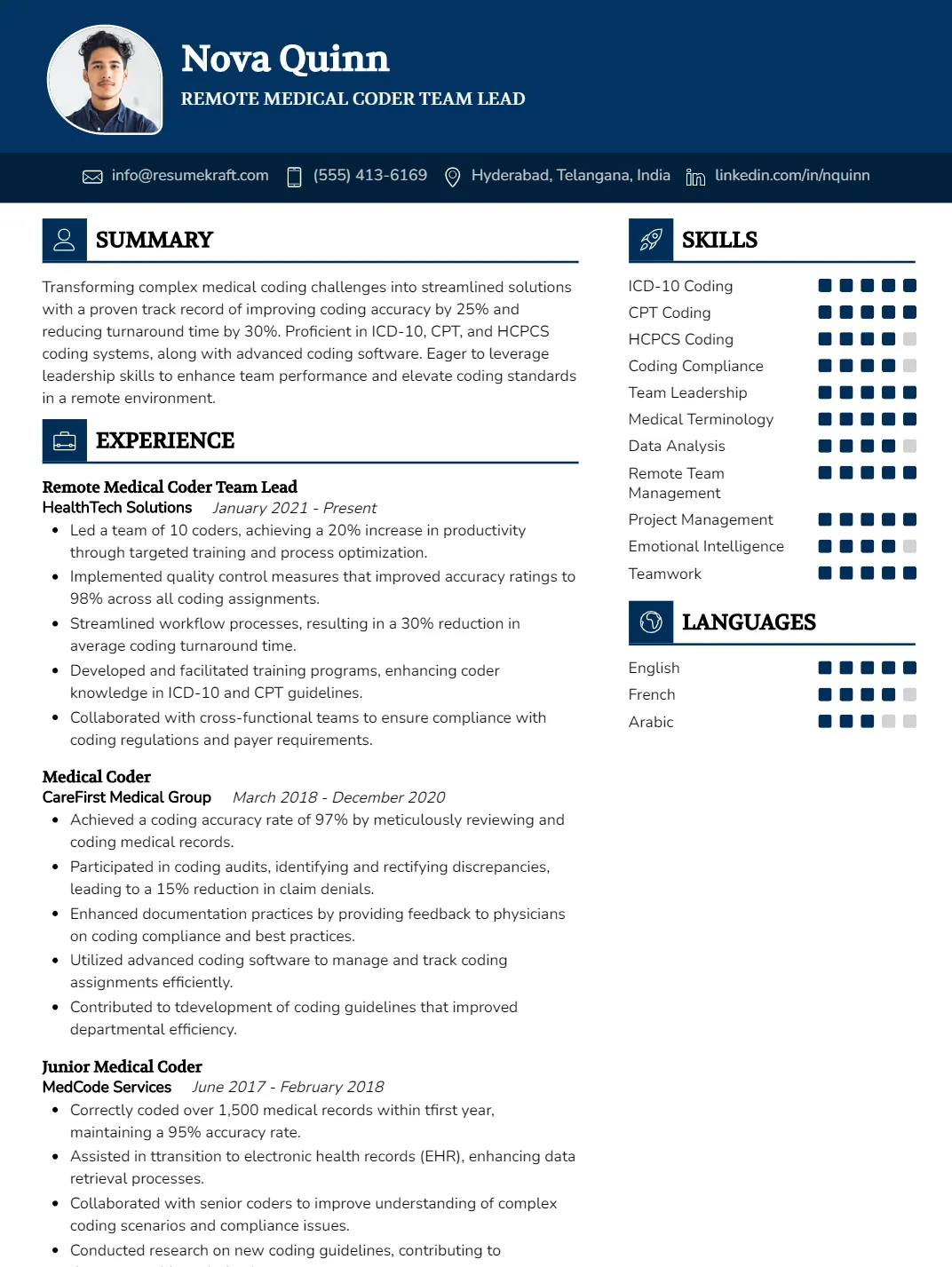
Why This Resume Works
This resume effectively highlights the candidate’s extensive experience and key skills relevant to a Remote Medical Coder Team Lead position, showcasing expertise in ICD-10, CPT, and HCPCS coding. The structured format emphasizes leadership capabilities and compliance knowledge while ensuring ATS compatibility through the strategic use of industry-specific keywords. Additionally, quantifiable achievements in coding accuracy and team performance are presented clearly, demonstrating the candidate’s ability to enhance productivity and maintain high standards within a remote setting.
Outpatient Medical Coding Specialist Resume
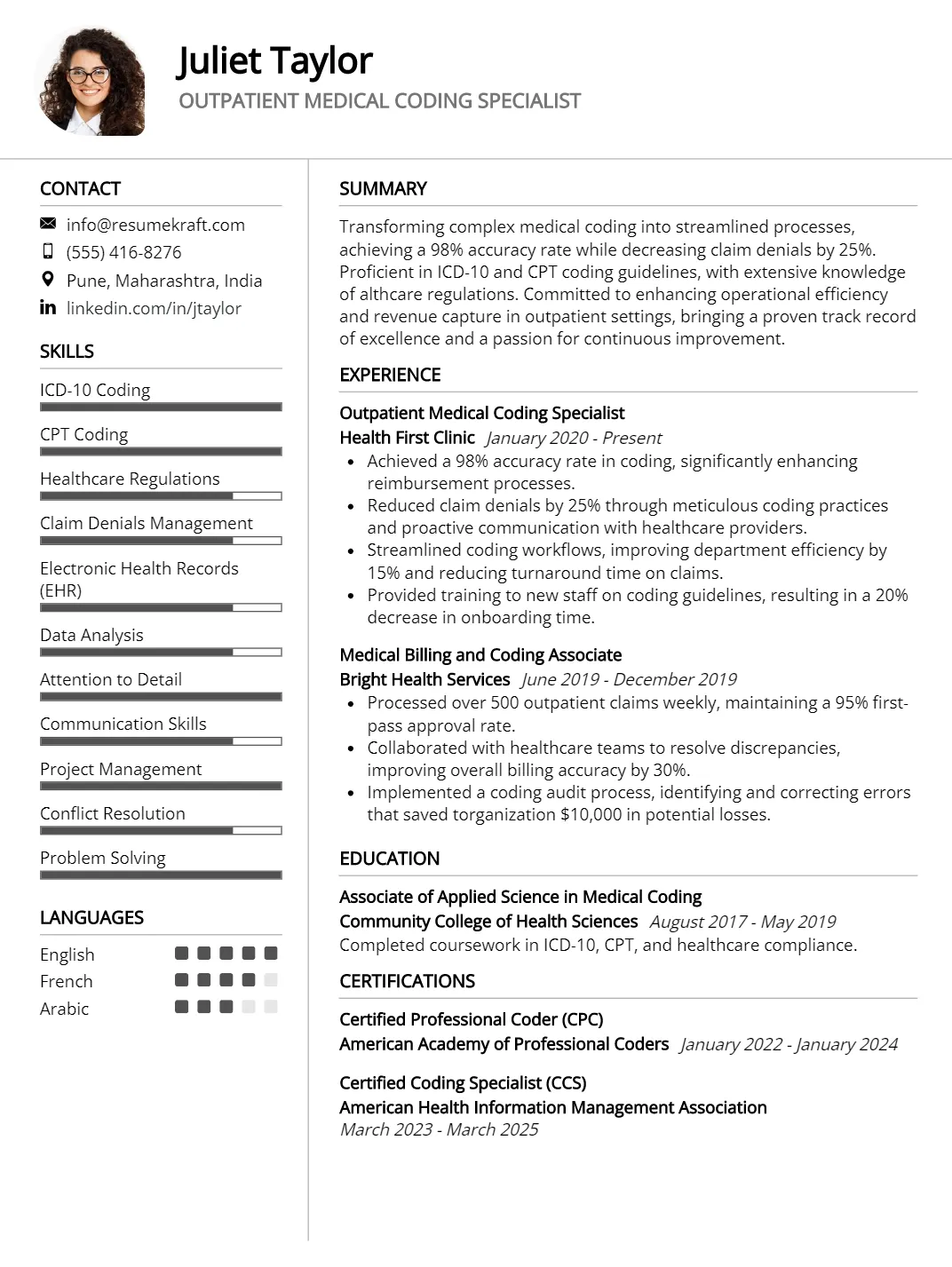
Why This Resume Works
This resume is effective for the Outpatient Medical Coding Specialist position due to its targeted inclusion of essential skills like ICD-10 and CPT coding, along with expertise in healthcare regulations and claim denials management. The structured format highlights relevant experience of approximately five years, making it easy for hiring managers to identify qualifications quickly. Additionally, the resume is optimized for ATS compatibility by incorporating industry-specific keywords. Strategic presentation of achievements further demonstrates proficiency, ensuring alignment with the demands of outpatient medical coding roles.
Pediatric Medical Coding Specialist Resume
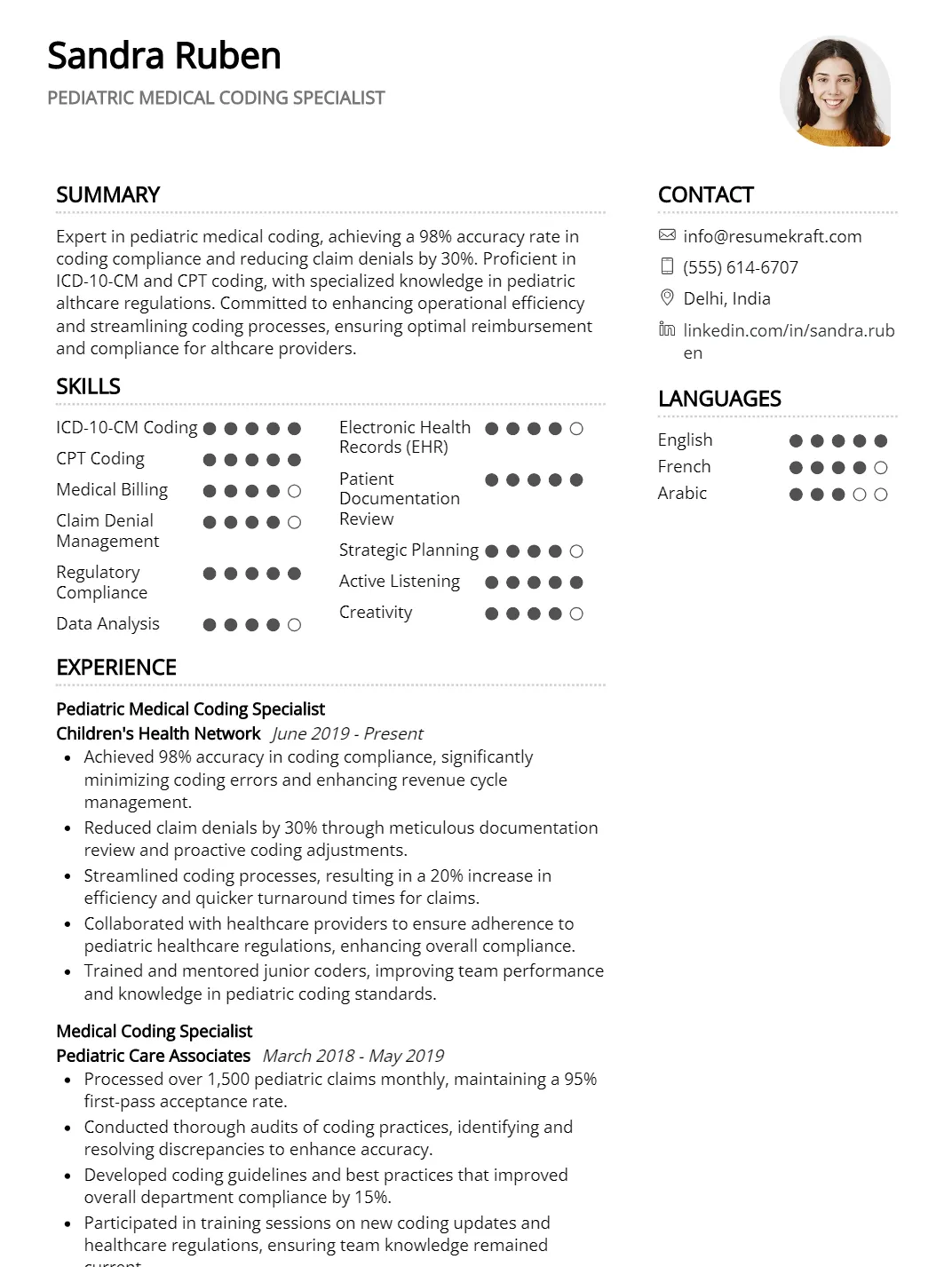
Why This Resume Works
This resume effectively highlights the candidate’s relevant skills in ICD-10-CM and CPT coding, essential for a Pediatric Medical Coding Specialist. With approximately seven years of experience, the structured format clearly showcases expertise in medical billing and claim denial management. The use of industry-specific keywords enhances ATS compatibility, ensuring visibility to hiring managers. Additionally, strategic presentation of achievements illustrates the candidate’s impact on regulatory compliance and efficiency in coding processes, making this resume particularly compelling for the position.
Advanced Medical Reimbursement Analyst Resume
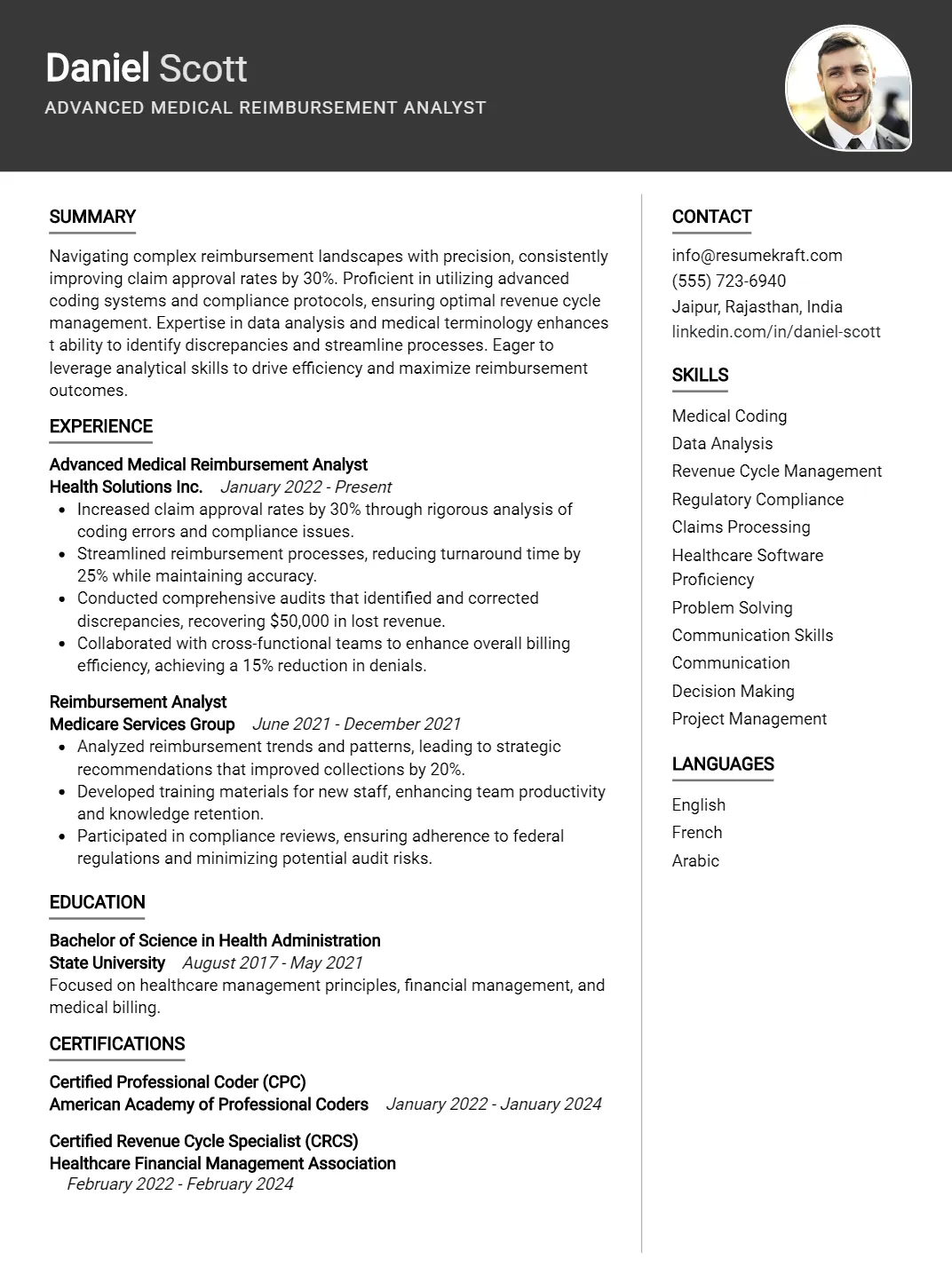
Why This Resume Works
This resume effectively highlights the candidate’s relevant skills, such as medical coding and data analysis, which are crucial for an Advanced Medical Reimbursement Analyst. With three years of targeted experience in reimbursement roles, it showcases a strong foundation in revenue cycle management and regulatory compliance. The structured format enhances readability, ensuring key qualifications stand out for both hiring managers and ATS compatibility. Furthermore, strategic presentation of achievements demonstrates the candidate’s impact on claims processing efficiency, aligning perfectly with industry expectations.
Healthcare Revenue Integrity Analyst Resume
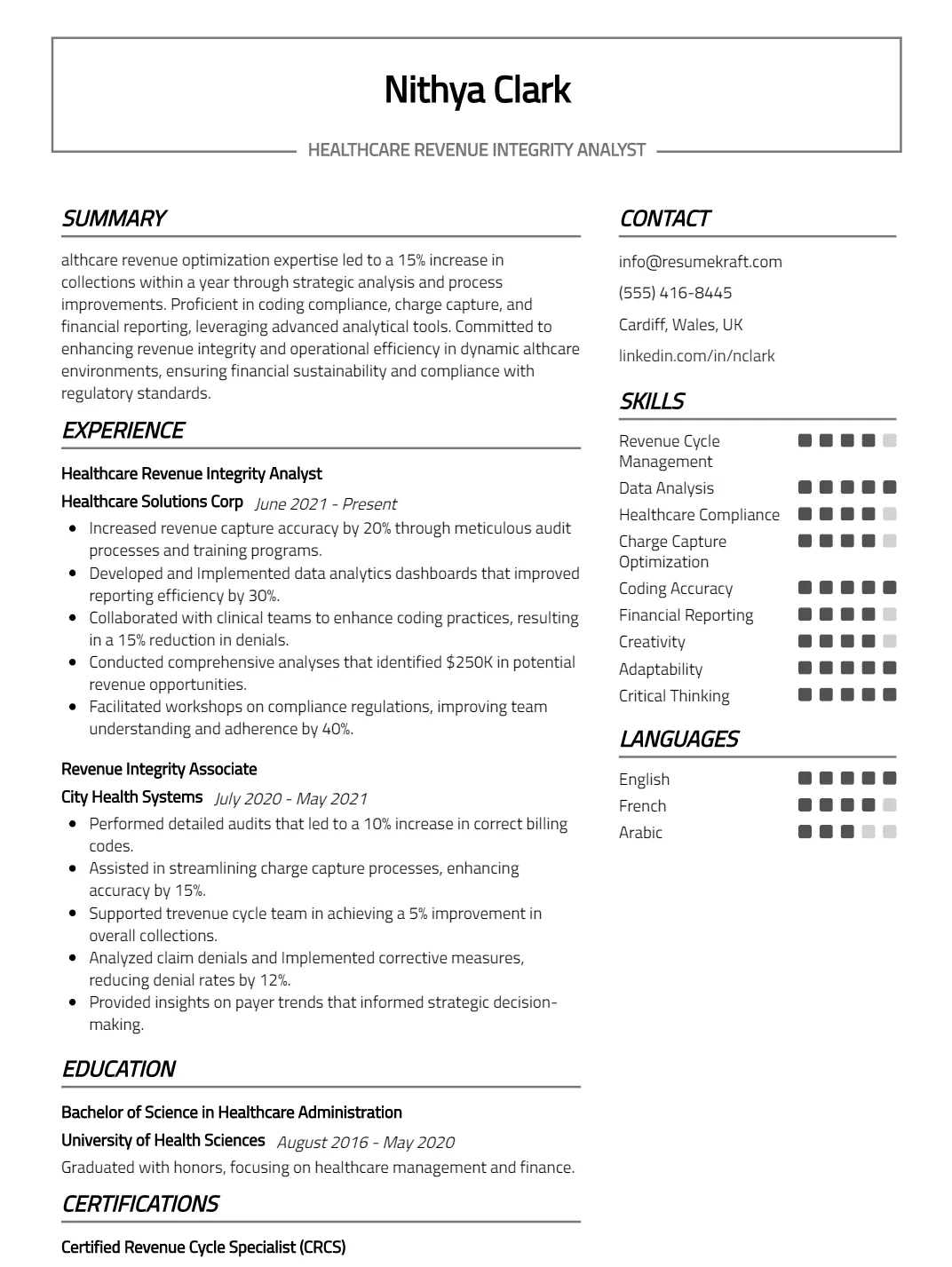
Why This Resume Works
This resume effectively highlights the candidate’s relevant skills and experience for a Healthcare Revenue Integrity Analyst position, showcasing expertise in Revenue Cycle Management and Healthcare Compliance. The structured format emphasizes key competencies while ensuring clarity, making it easy for employers to identify qualifications. Its ATS-friendly design incorporates industry-specific keywords, enhancing visibility in applicant tracking systems. Additionally, the strategic presentation of achievements related to Charge Capture Optimization and Coding Accuracy underscores the candidate’s impact in previous roles, appealing directly to potential employers in the healthcare sector.
Health Information Management Specialist Resume
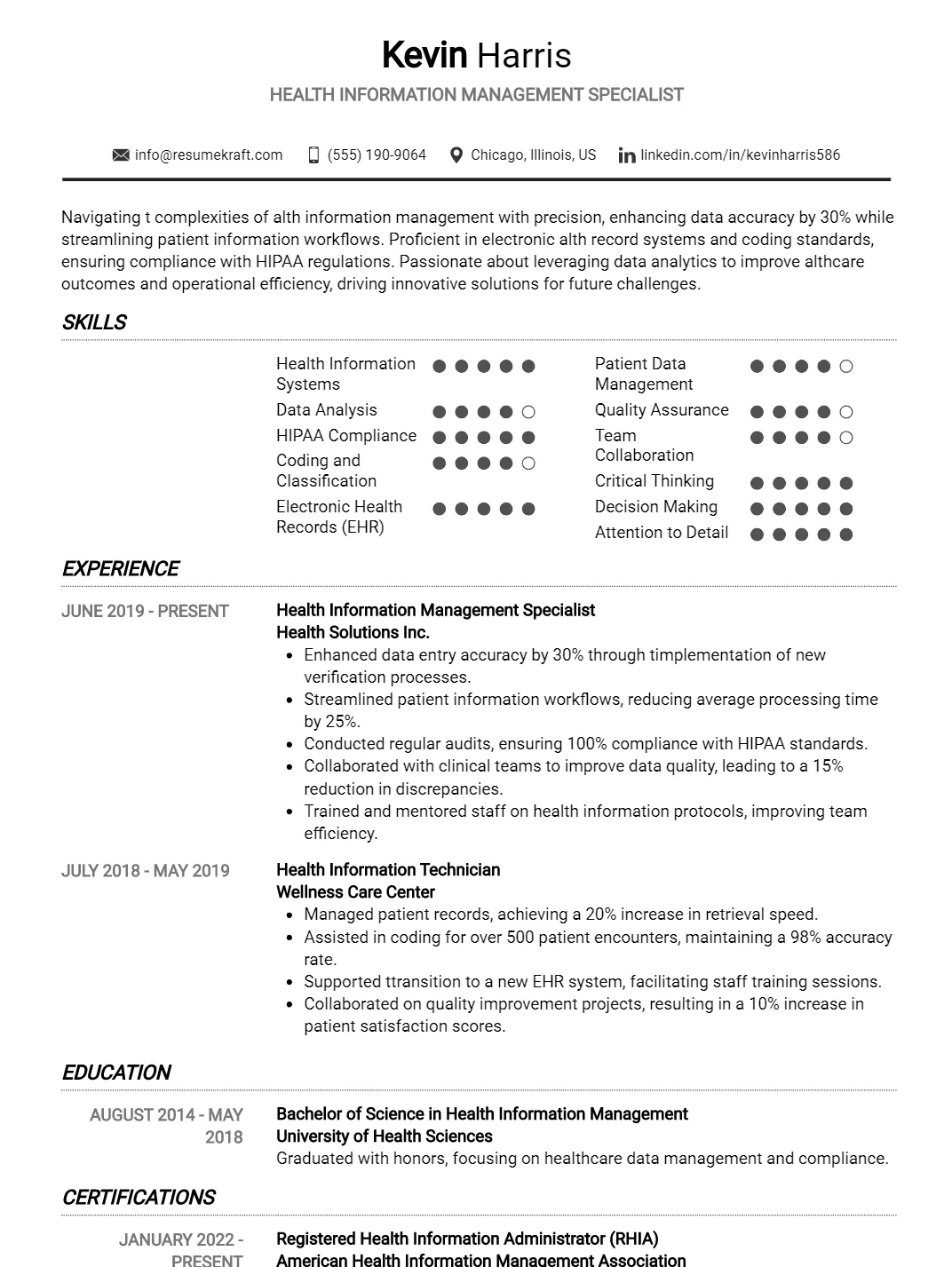
Why This Resume Works
This resume effectively positions the candidate as a Health Information Management Specialist by showcasing relevant skills in Health Information Systems, Data Analysis, and HIPAA Compliance, directly aligning with job requirements. The structured format emphasizes both experience and key competencies, making it easy for hiring managers to assess qualifications quickly. Its ATS-friendly design incorporates industry-specific keywords, enhancing visibility during automated screenings. Additionally, the strategic presentation of achievements highlights significant contributions in coding and EHR management, underscoring the candidate’s value to potential employers in this field.
Emergency Department Medical Coder Resume
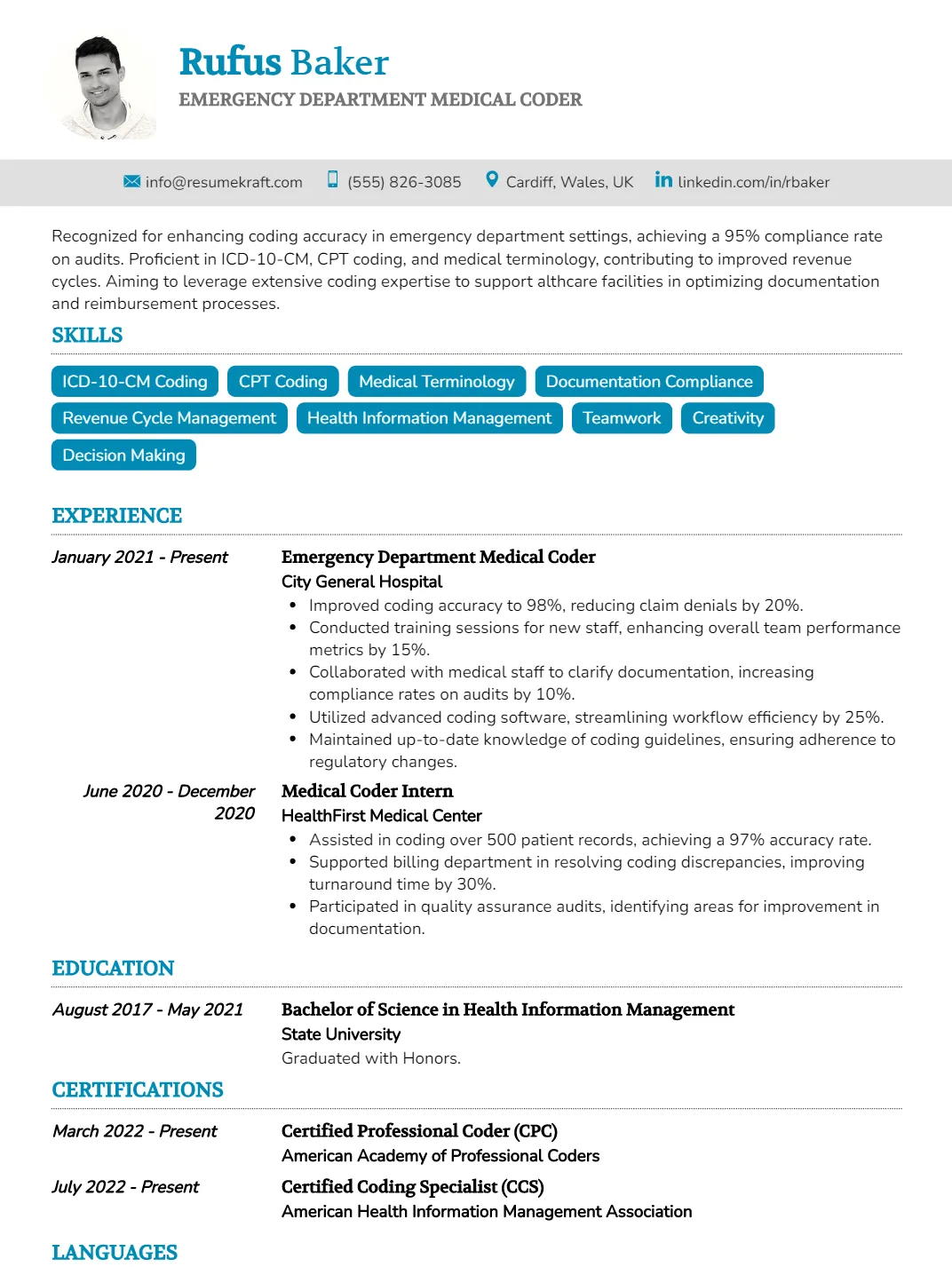
Why This Resume Works
This resume effectively highlights the candidate’s relevant skills in ICD-10-CM and CPT coding, essential for an Emergency Department Medical Coder position. With approximately four years of experience, including a dedicated medical coder internship, it demonstrates practical expertise. The clear format enhances readability, while strategic use of keywords ensures ATS compatibility. Additionally, the presentation of achievements in documentation compliance and revenue cycle management showcases the candidate’s ability to improve operational efficiency—key factors that resonate with hiring managers in this field.
Surgical Medical Coding Specialist Resume
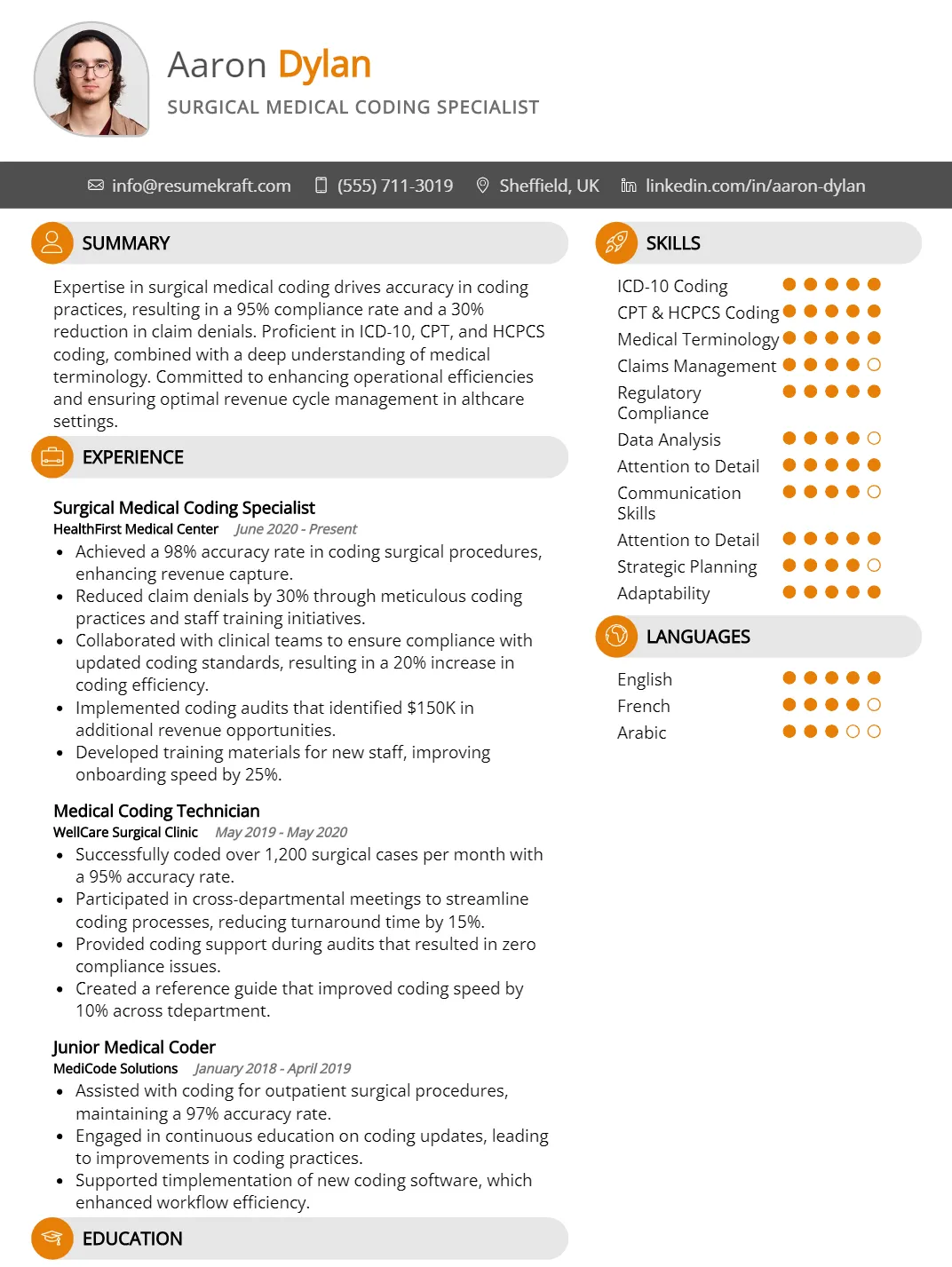
Why This Resume Works
This resume effectively highlights the candidate’s expertise as a Surgical Medical Coding Specialist through its emphasis on key skills like ICD-10, CPT, and HCPCS coding, along with seven years of relevant experience. The structured format ensures clarity, making it easy for hiring managers to quickly assess qualifications. Additionally, the use of industry-specific keywords enhances ATS compatibility. By strategically presenting achievements related to claims management and regulatory compliance, the resume aligns perfectly with the demands of this specialized role in medical coding.
Medical Coding Compliance Auditor Resume
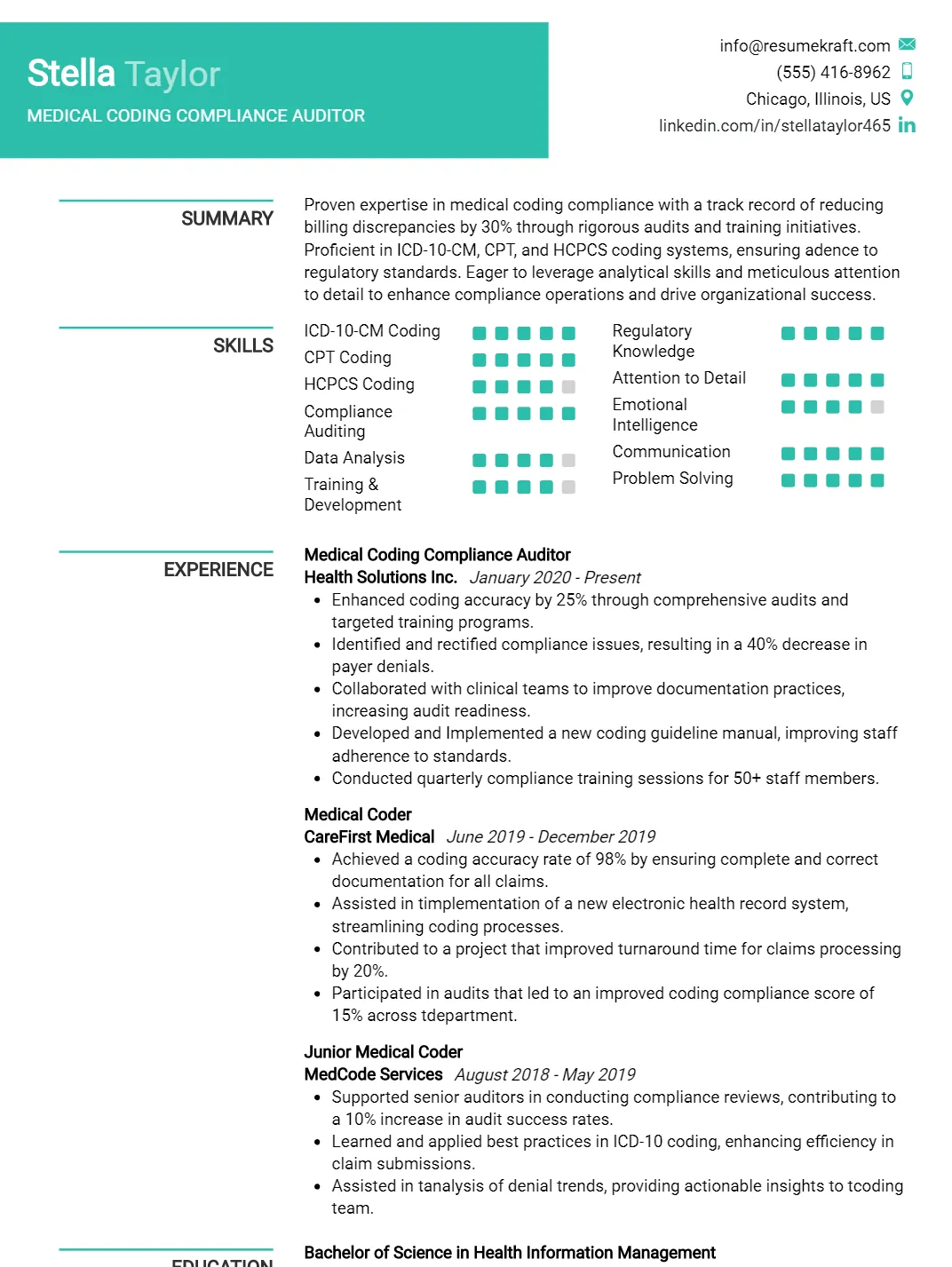
Why This Resume Works
This resume effectively highlights the candidate’s six years of relevant experience in medical coding and compliance auditing, showcasing expertise in ICD-10-CM, CPT, and HCPCS coding. Its clear structure emphasizes key skills aligned with the Medical Coding Compliance Auditor role, enhancing readability for hiring managers. The use of industry-specific keywords ensures ATS compatibility, increasing visibility during the selection process. Additionally, strategic presentation of achievements demonstrates a proven track record in compliance and data analysis, making it a compelling choice for this position.
Telehealth Medical Coding Expert Resume
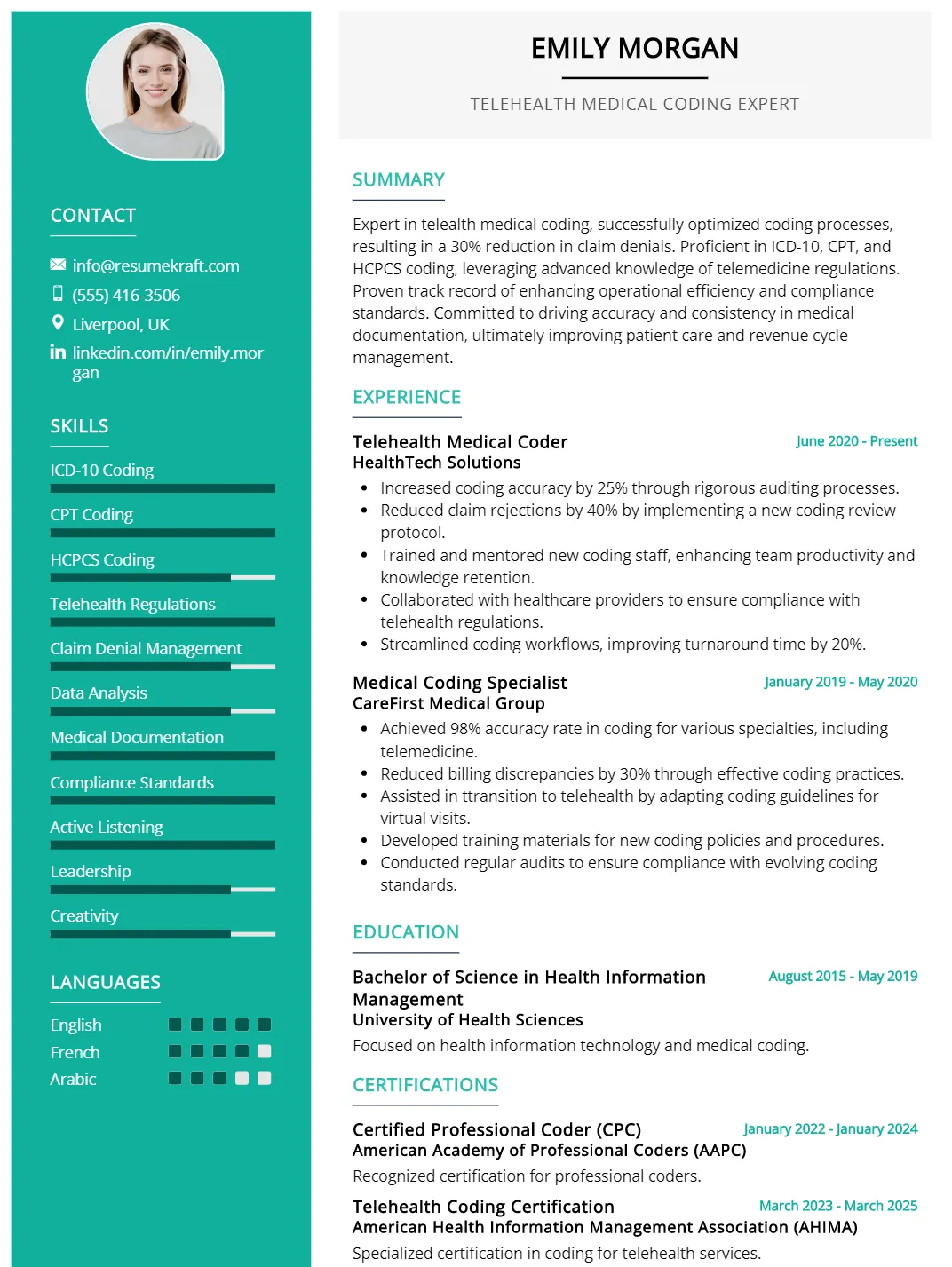
Why This Resume Works
This resume effectively highlights the candidate’s relevant skills, such as ICD-10, CPT, and HCPCS coding, alongside their six years of experience as a Telehealth Medical Coder. Its structured format ensures clarity and easy navigation, enhancing readability for hiring managers. The use of industry-specific keywords enhances ATS compatibility, ensuring the resume passes automated screenings. Additionally, strategic presentation of achievements in claim denial management showcases the candidate’s impact in telehealth coding, making them a compelling choice for the Telehealth Medical Coding Expert position.
How to format a Medical Coder resume
Proper formatting is crucial for a Medical Coder resume as it enhances readability and professionalism. A clear and organized resume format not only highlights your qualifications but also makes a strong first impression on potential employers.
- Use a clean, professional font such as Arial or Calibri in size 10-12 to ensure readability. Maintain consistent spacing and margins for a polished look throughout your resume.
- Organize your resume into clear sections, including contact information, summary, skills, experience, and education. This structured layout allows employers to quickly locate key information.
- Utilize bullet points to list your achievements and responsibilities, making it easier for hiring managers to skim through your qualifications. Begin each bullet with action verbs for greater impact.
- Keep your resume to one page if you have less than 10 years of experience. Prioritize the most relevant information related to medical coding to maintain focus and brevity.
- Include specific coding certifications and relevant software proficiency prominently in your skills section. This highlights your qualifications at a glance and aligns with the needs of hiring organizations.
How to write your Medical Coder resume experience
Effectively presenting work experience on a Medical Coder resume is vital, as this section showcases your practical knowledge and expertise in coding and billing processes. Employers seek candidates who can demonstrate their ability to accurately translate medical records into standardized codes, ensuring compliance and maximizing reimbursement.
A well-structured experience section highlights your specific roles, responsibilities, and accomplishments in previous positions, making it easier for hiring managers to assess your qualifications. Use metrics and specific examples to illustrate your impact in the field, demonstrating your proficiency and attention to detail.
Worked as a Medical Coder. Handled codes and billing. Did my job well.
Coded over 1,200 medical records monthly, achieving 99% accuracy in ICD-10 coding, which improved billing efficiency and reduced claim denials by 20%.
How to list your hard skills and soft skills on your resume
In the competitive field of medical coding, showcasing both hard and soft skills on your resume is crucial. Hard skills demonstrate your technical proficiency in coding systems, medical terminology, and compliance regulations, while soft skills highlight your ability to communicate effectively, work independently, and manage time efficiently. A well-rounded resume that features a blend of both skill types can set you apart from other candidates and indicate your capability to contribute positively to a healthcare setting.
Hard Skills:
- ICD-10 Coding: Proficient in using the International Classification of Diseases coding system.
- CPT Coding: Skilled in Current Procedural Terminology coding for billing purposes.
- HCPCS Coding: Familiar with Healthcare Common Procedure Coding System for Medicare and Medicaid.
- Medical Terminology: Knowledgeable in medical terms and abbreviations essential for accurate coding.
- Data Entry: Quick and accurate data entry skills for patient information and coding.
- Compliance Knowledge: Understanding of healthcare regulations and compliance standards.
- Electronic Health Records (EHR): Experience with EHR systems for efficient coding and documentation.
- Auditing Skills: Ability to conduct coding audits to ensure accuracy and compliance.
- Insurance Guidelines: Familiarity with different insurance policies and reimbursement processes.
- Analytical Skills: Strong analytical abilities to interpret clinical data and apply appropriate codes.
- Attention to Detail: Meticulous in reviewing codes to prevent errors and ensure precision.
- Documentation Review: Competent in examining clinical documentation for coding accuracy.
- Software Proficiency: Experienced with coding software and medical billing applications.
- Time Management: Efficiently manage coding workload to meet deadlines.
- Quality Assurance: Conduct quality checks to maintain coding standards and accuracy.
Soft Skills:
- Communication: Effectively communicate with healthcare professionals to clarify documentation.
- Problem-Solving: Strong problem-solving skills to address coding discrepancies or challenges.
- Team Collaboration: Ability to work collaboratively with medical staff and coding teams.
- Adaptability: Flexible and able to adjust to changes in coding standards and regulations.
- Critical Thinking: Analyze situations and make informed decisions regarding coding practices.
- Empathy: Understanding patient needs and concerns while coding medical records.
- Organizational Skills: Strong organizational abilities to manage multiple coding projects.
- Integrity: Uphold ethical standards in coding and patient confidentiality.
- Dependability: Reliable in meeting deadlines and maintaining accuracy in work.
- Motivation: Self-motivated to continuously improve coding knowledge and skills.
- Conflict Resolution: Ability to resolve disputes or misunderstandings related to coding.
- Interpersonal Skills: Build rapport with colleagues and healthcare providers.
- Time Management: Effectively prioritize tasks to meet various coding deadlines.
- Customer Service: Provide excellent support to healthcare providers and patients.
- Attention to Feedback: Open to constructive feedback for professional growth.
- Stress Management: Maintain composure under pressure to meet tight deadlines.
How to list your certifications and education on your resume
When presenting certifications and education on a Medical Coder resume, it is essential to prioritize relevant qualifications that align with the role. Highlight certifications such as Certified Professional Coder (CPC) or Certified Coding Specialist (CCS), as these demonstrate your expertise in medical coding practices. Additionally, include your degree in health information technology or a related field, ensuring that the education section is concise and clearly formatted for easy reading.
List your certifications in order of relevance and date obtained, providing the official title and the certifying body. For education, include the degree earned, institution name, and graduation date. This structured approach showcases your qualifications effectively and aids potential employers in quickly assessing your suitability for the position.
Got a coding certification and went to school for health stuff. I learned coding on the job.
Certified Professional Coder (CPC), American Academy of Professional Coders, 2022. Associate of Applied Science in Health Information Technology, XYZ Community College, Graduated May 2021.
How to write your Medical Coder resume summary or objective
A strong resume summary or objective is crucial for a Medical Coder position as it provides a quick snapshot of your qualifications and career aspirations. A well-crafted summary highlights your skills and experiences relevant to coding, while an objective statement outlines your career goals and what you aim to achieve in the role. Use a summary if you have relevant experience to showcase, whereas an objective is more suitable for entry-level positions or career changers.
Seeking a job in medical coding. I have some experience and am willing to learn more about coding and billing processes.
Detail-oriented Medical Coder with over 3 years of experience in ICD-10 and CPT coding, aiming to leverage expertise in a healthcare setting to enhance patient data accuracy and revenue cycle efficiency.
Additional sections for a Medical Coder resume
Including additional sections in your Medical Coder resume can significantly enhance your candidacy by showcasing your unique qualifications and relevant experiences. These sections can highlight your specialized skills, certifications, and contributions to the field, making your resume stand out to potential employers.
- Certifications: Listing relevant certifications, such as CPC or CCS, demonstrates your commitment to professional development and validates your expertise in medical coding, which can set you apart from other candidates.
- Professional Affiliations: Membership in organizations like AAPC or AHIMA indicates your dedication to the coding profession and can provide networking opportunities and access to industry resources that enhance your credibility.
- Continuing Education: Highlighting courses or training sessions you’ve completed shows your commitment to staying current with coding guidelines and regulations, which is crucial in a constantly evolving healthcare landscape.
- Technical Skills: Detailing your proficiency in coding software and electronic health record (EHR) systems illustrates your technical capabilities, making you a more appealing candidate for employers seeking efficiency in their coding departments.
- Achievements: Including specific accomplishments, such as improving coding accuracy rates or streamlining processes, demonstrates your impact in previous roles and showcases your ability to contribute positively to a new employer.
Key takeaways for writing a professional Medical Coder resume
- Highlight relevant certifications, such as CPC or CCS, to demonstrate your qualifications and expertise in medical coding, making your resume stand out to employers.
- Use quantifiable achievements, like coding accuracy rates or billing efficiency improvements, to showcase your impact in previous roles and enhance your resume’s appeal.
- Utilize professional resume templates to ensure your layout is clean and organized, making it easier for hiring managers to quickly assess your qualifications.
- Tailor your resume for each job application by incorporating keywords from the job description, helping you pass through Applicant Tracking Systems (ATS).
- Consider using an ai resume builder to streamline the process, ensuring your resume is polished and effectively highlights your skills and experiences in medical coding.
Frequently Asked Questions
How long should my Medical Coder resume be?
Your Medical Coder resume should ideally be one page, especially if you have less than 10 years of experience. This length allows you to present a concise overview of your skills, certifications, and relevant work history without overwhelming the reader. If you have extensive experience, you may extend it to two pages, but ensure that every detail is pertinent and showcases your expertise in coding and compliance in the healthcare industry.
What is the best format for a Medical Coder resume?
The best format for a Medical Coder resume is the chronological format, which highlights your work experience in reverse chronological order. This format is effective as it showcases your most recent positions and relevant coding experience upfront. Use clear headings, bullet points for readability, and include sections for your certifications, technical skills, and education. Additionally, consider including a summary statement that encapsulates your qualifications and professional objectives.
What should I highlight on my Medical Coder resume to stand out?
To stand out as a Medical Coder, highlight your certifications such as CPC, CCS, or CCA, as these demonstrate your professional qualifications. Emphasize your proficiency in coding systems like ICD-10, CPT, and HCPCS, along with your experience in medical billing and compliance. Additionally, showcase any specialized areas of coding, such as inpatient or outpatient, and include any achievements like error rate reductions or successful audits to underscore your impact in previous roles.
What are some ways to quantify my experience on my Medical Coder resume?
Quantifying your experience on a Medical Coder resume can greatly enhance its effectiveness. Include metrics such as the number of claims processed per day, accuracy rates, or reductions in claim denials as a result of your coding. For example, you might mention “Achieved 98% accuracy in coding over three years” or “Reduced coding errors by 30% through meticulous review.” These figures provide concrete evidence of your capabilities and contributions to prospective employers.

